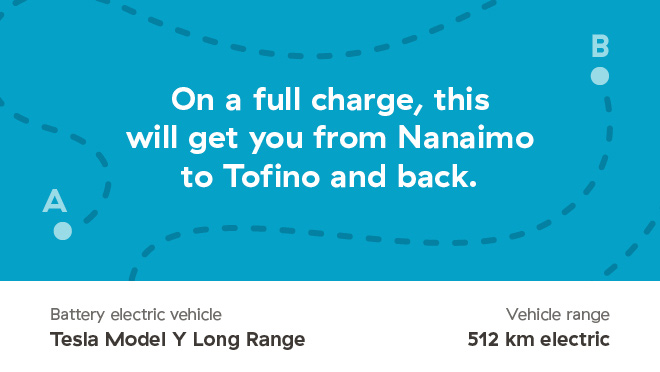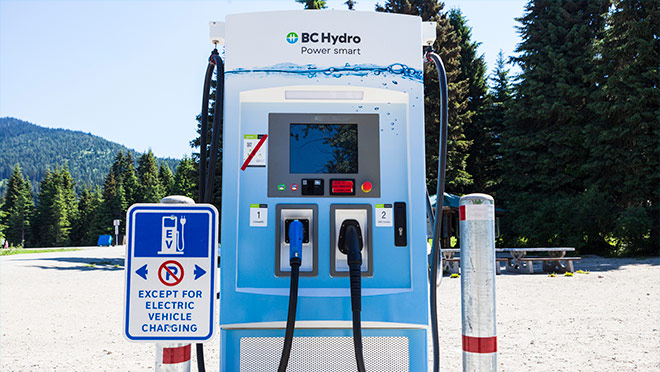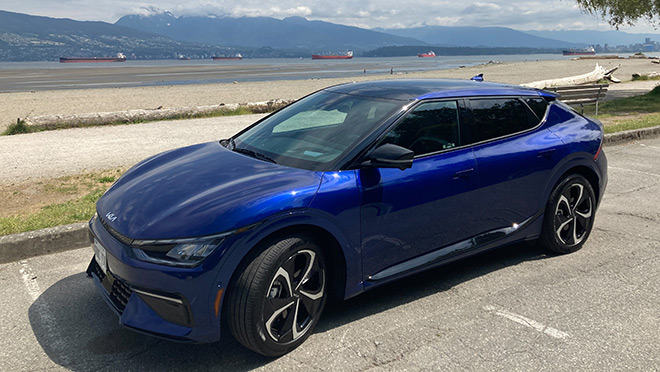Calculate how much you could save on fuel with an EV
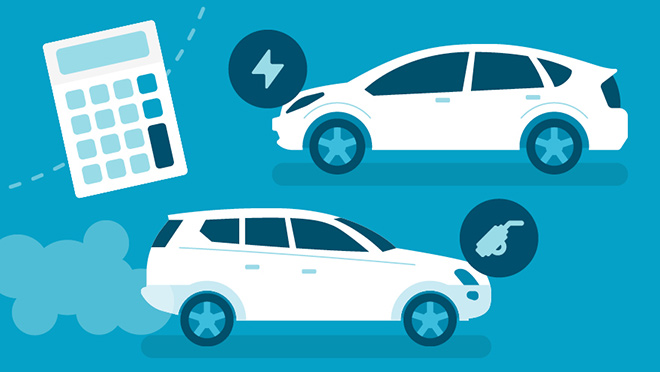
Fuel savings tool does the math, and the math is startling
Rob Klovance
For bchydro.com
What would I save on fuel by trading in my gas-powered 2016 Mazda CX-5 for a battery-electric SUV of a similar size? It turns out there's a tool to help determine that.
And in these days of wildly fluctuating gas prices, the gap in fuel costs between gas-powered vehicles and plug-in vehicles propelled by clean and consistently-priced BC Hydro electricity has grown. Not surprisingly, a 2022 BC Hydro report found that in B.C. – where more EVs are sold per capita than anywhere else in North America – 85% of people pegged rising oil and gas prices as the biggest reason for the increased popularity of EVs.
To help British Columbians do the math, we've updated our online EV fuel savings calculator to reflect current gas prices supplied by Natural Resources Canada. So, when I select a vehicle that's a rough equivalent to what will be a great replacement for my CX-5 – a Volkswagen ID.4 that has great battery range and the ground clearance I need to navigate B.C.'s back roads – the calculator estimates I'd save up to $2,815 a year by making that switch.
And the tool offers some more estimates that can help me with my decision.
The ID.4's range of 422 km would be enough for me to drive from Nanaimo to Tofino and back on a full charge, even though there are BC Hydro fast charging stations at both locations – and several along the route – if I needed to top up on my journey.
The tool also shows that the carbon reduction of making the switch could be roughly equivalent to planting 204 trees every year. That's because BC Hydro's water-powered electricity is 98% clean, a fact that makes operating an EV a more eco-friendly choice in B.C. than almost anywhere else in the world. In North America, the only other regions that compete are Quebec and Manitoba, which also rely on hydroelectricity.
The comparison tool also includes pricing information. With up to $9,000 in combined federal and B.C. new electric vehicle incentives, the purchase price of the base model ID.4 could be as low as $36,000. That's less than $4,000 more than the base model of the CX-5, which means that fuel costs savings alone could cover that price gap in as little as two years. And without even factoring in the lower maintenance costs of EV ownership, it's no contest after five years.
Just announced: B.C. improves EV rebates, based on income level
EVs have far fewer mechanical parts than a gas-powered car, and many components can last much longer before requiring maintenance. For instance, the brakes in an EV could last over 300,000 km, as most EV braking is regenerative. This means that instead of relying on friction brakes to slow or stop, the electric motor slows down the vehicle as you take your foot off the accelerator, capturing that energy and using it to recharge the battery.
More examples: Savings by car and distance driven
The more you drive your car, the bigger the "fuel" savings each year. Here are a few other sample calculations from the online comparison tool.
Sub-compact, under $40,000, 10,000 km per year: For a driver who wants a small, fun urban commuter, a switch to a Mini Cooper SE 3-door could save about $1,400 a year in fuel costs over a similar-sized gas-powered car.
Compact, under-$40,000, 15,000 km per year: The Mini isn't big enough, or have enough range for you? Go with a Chevrolet Bolt, and you not only get up to 417 km between charges, you would also save up to $2,500 a year in fuel costs over a comparable 5-seat gas-powered vehicle. And after up to $9,000 in federal and B.C. new-EV rebates, the cost of the base model of the Bolt comes in at about $30,000.
Mid-size, under-$55,000, 20,000 km per year: Are you a road-tripper who needs lots of cargo space for those trips? The Hyundai Ioniq 5 can come in at about $40,000 after rebates and can save you almost $2,200 a year in fuel over a similar-sized gas-guzzler.
SUV, over $55,000, 20,000 km per year: Opting for the range that goes with a Tesla, choosing the Model Y Long Range not only gives you up to 512 km between charges, it also saves you up to $3,600 annually on fuel over a similar-sized SUV. And the carbon reduction in going electric will save you the equivalent of planting 216 trees every year.
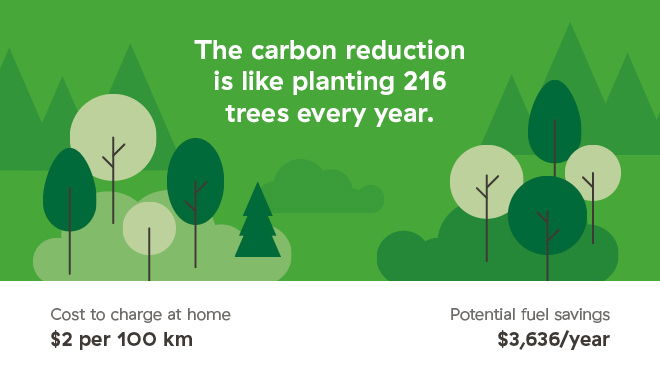
How the calculator works for both electric and hybrid plug-in vehicles
The estimated savings calculator uses several factors to determine potential savings when switching to an electric vehicle or a hybrid electric vehicle.
These include:
- Fuel cost savings based on Natural Resources Canada data reflecting the average weekly price of mid-grade fuel in Metro Vancouver
- At-home EV charging costs based on the battery size of the selected vehicle, and electricity price of $0.1118/kWh
- Fuel costs incurred for plug-in hybrid electric vehicles when daily mileage is over the electric range.
- Cost estimate options for 10,000 km/year, 15,000 km/year, or 20,000 km/year.
